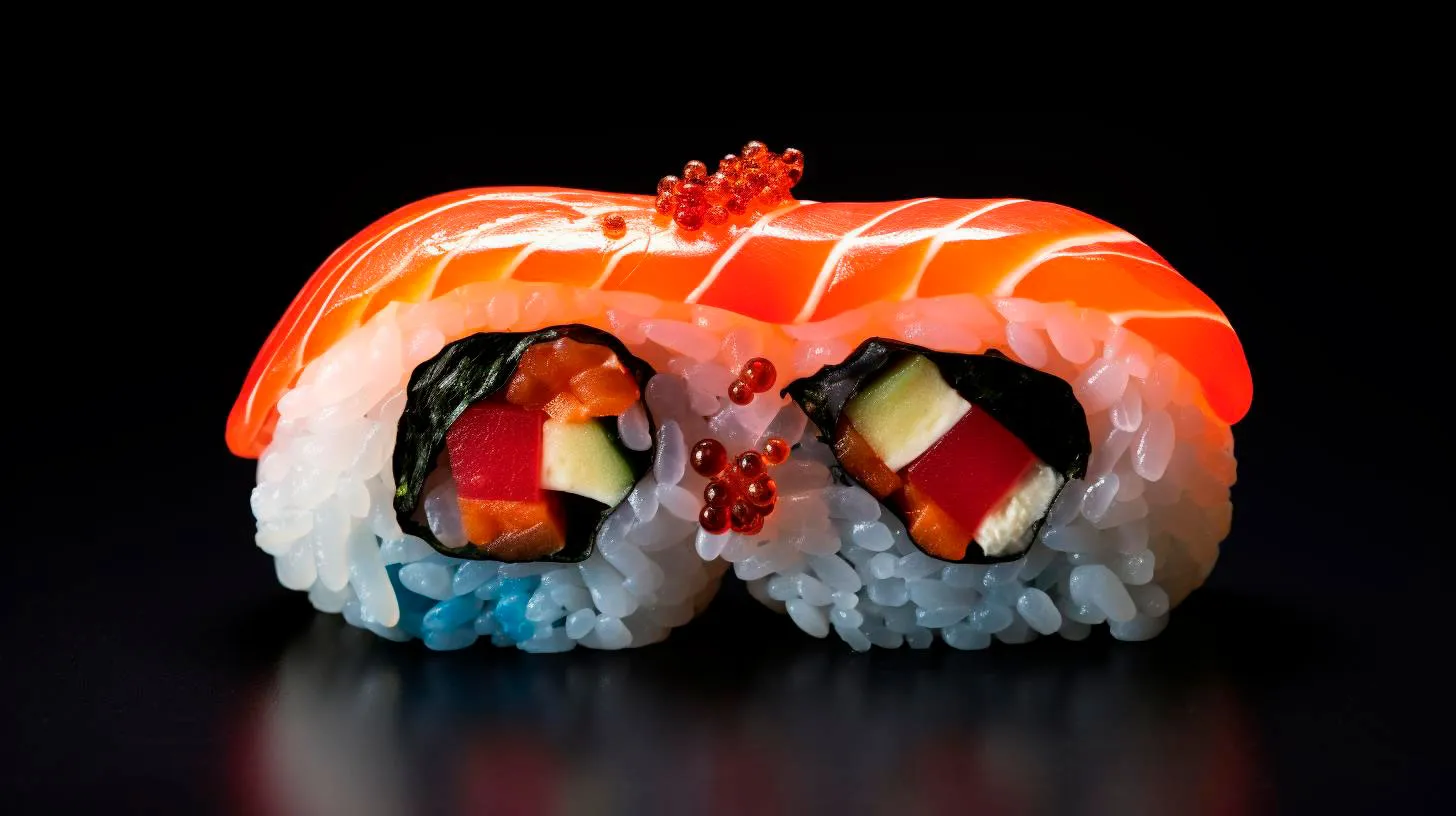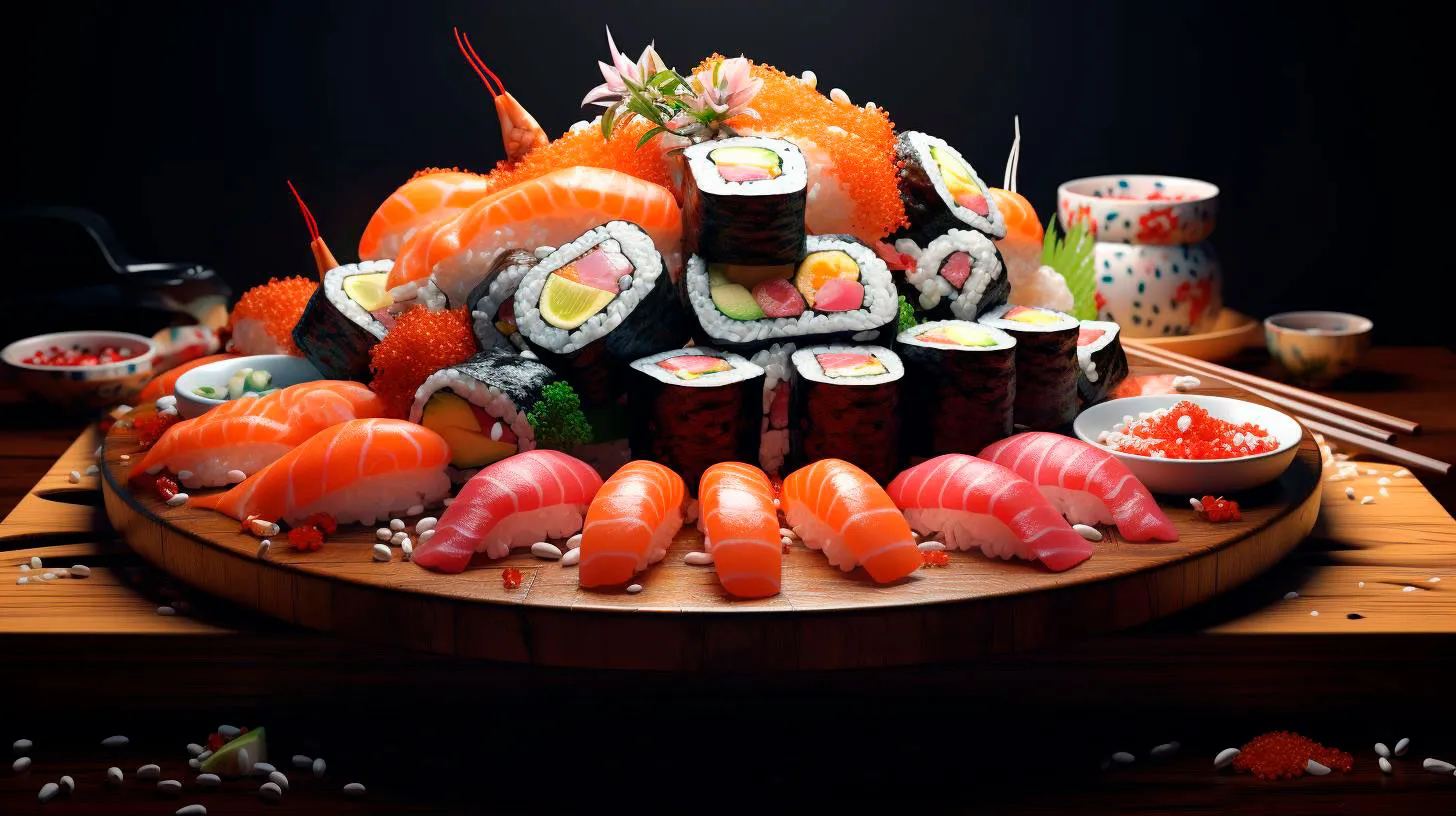Deliciously Fish-Free: The Rise of Vegan Sushi Rolls
These innovative creations offer a delicious and cruelty-free alternative to traditional sushi, and they are quickly gaining traction among food enthusiasts worldwide.
But what exactly are vegan sushi rolls? And why are they becoming increasingly popular? Let’s dive in and explore the delightful world of fish-free sushi!
What Are Vegan Sushi Rolls?
Vegan sushi rolls, as the name suggests, are sushi rolls without any animal products. Instead of fish or seafood, these rolls are filled with a diverse range of plant-based ingredients that provide the same satisfying flavors and textures. The most common vegan alternatives include avocado, cucumber, tofu, carrot, sweet potato, and mango.
While purists may argue that vegan sushi is not “authentic,” it offers a creative twist on traditional sushi and caters to a growing community of individuals seeking healthier and more sustainable food options.
The Advantages of Vegan Sushi Rolls
Vegan sushi rolls offer numerous advantages, not only for those following a plant-based diet but also for anyone looking to explore new culinary possibilities. Let’s take a closer look at some of the key benefits:
1. Healthier Option
- Vegan sushi rolls are typically lower in calories and saturated fats compared to their traditional counterparts.
- Plant-based ingredients used in vegan sushi provide valuable nutrients, such as vitamins, minerals, fiber, and antioxidants.
- Studies show that a plant-based diet can help reduce the risk of various chronic diseases, including heart disease and certain types of cancer.
2. Sustainable and Environmentally Friendly
- Traditional sushi often relies on overfished species, contributing to the depletion of marine resources and disrupting aquatic ecosystems.
- Vegan sushi promotes the use of sustainable ingredients, reducing the strain on oceans and supporting a more environmentally friendly approach to food production.
3. Allergy-Friendly
- For individuals with seafood allergies or dietary restrictions, vegan sushi is an excellent alternative that allows them to enjoy the flavors and experience of sushi without any concerns.
- Vegan sushi rolls are also suitable for those following a gluten-free or dairy-free diet.
The Rise of Vegan Sushi Rolls
Vegan sushi rolls have experienced a significant surge in popularity in recent years. Here are some compelling statistics highlighting this culinary trend:
- According to Google Trends, searches for “vegan sushi” have increased by more than 500% worldwide in the past five years.
- In a recent survey by Vegetarian Times, 19% of respondents reported eating vegetarian sushi at least once a month.
- Major sushi chains and restaurants are now offering dedicated vegan sushi options to cater to the growing demand.
- Celebrity influencers and social media platforms have played a crucial role in promoting vegan sushi, driving its popularity among younger generations.
The growing interest in vegan sushi not only reflects changing dietary preferences but also a global shift towards conscious and sustainable eating habits.
Key Takeaways
Vegan sushi rolls offer an exciting and delicious twist on traditional Japanese cuisine. Here are the key takeaways from the rise of this fish-free sushi trend:
- Vegan sushi rolls provide a healthier alternative to traditional sushi, with fewer calories and higher nutritional value.
- They contribute to a more sustainable and environmentally friendly food culture, promoting the use of plant-based ingredients instead of overfished seafood.
- Vegan sushi is suitable for individuals with dietary restrictions or allergies, allowing them to enjoy the flavors and experience of sushi safely.
- The popularity of vegan sushi is on the rise, driven by increasing global interest in plant-based diets and greater awareness of sustainability and animal welfare.
So, whether you’re a dedicated vegan or simply looking to expand your culinary horizons, don’t miss out on the delightful and flavorful world of vegan sushi rolls!
Seaweed and Vegetable Roe Unveiling Vegan Caviar as the New Luxury Delicacy
Environmental concerns and the rise of plant-based diets have paved the way for a new trend in the culinary world – vegan caviar. Developed using seaweed and vegetable roe, this innovative alternative offers a guilt-free and sustainable way to indulge in the extravagance of caviar.
The Rise of Vegan Caviar
Vegan caviar has gained popularity among both vegans and non-vegans alike. Its unique production methods, environmentally friendly nature, and remarkable flavor have captivated the culinary world. Made from seaweed extract, vegan caviar closely mimics the texture and taste of traditional caviar, providing a luxurious experience without harming marine life. Let’s explore the key features and advantages of this new sensation:
- Environmentally Friendly: Traditional caviar has contributed to the decline of sturgeon fish populations, causing ecological imbalances in aquatic ecosystems. Vegan caviar, on the other hand, is a sustainable choice that helps protect marine life.
- Nutrient-Rich: Seaweed, the primary ingredient in vegan caviar, is packed with essential minerals such as iodine, calcium, and iron. These nutrients promote good health and provide a nutritional boost to your diet.
- Flavor Variety: Vegan caviar comes in a wide range of flavors, offering an assortment of tastes to cater to diverse palates. From citrus-infused to smoky truffle, there’s a flavor for every discerning food lover.
- Texture Replication: By using advanced culinary techniques, vegan caviar replicates the delicate texture of traditional caviar. You can now enjoy the characteristic burst-in-your-mouth sensation without any guilt.
Key Takeaways
Vegan caviar has emerged as a luxurious delicacy, rivaling its traditional counterpart. It presents numerous advantages and key takeaways, including:
- Environmental friendliness and sustainability
- A nutrient-rich alternative for health-conscious individuals
- A wide range of flavors to suit diverse preferences
- Unparalleled replication of traditional caviar texture
The Latest Statistics
The rise of veganism and the growing environmental concerns have paved the way for vegan caviar’s ascent in the culinary world. Consider these insightful statistics:
- According to a study conducted by Future Market Insights, the global vegan caviar market is expected to showcase a CAGR of over 14% from 2021 to 2031.
- In 2020, the vegan food market reached a value of USD 14.2 billion, with a projection of reaching USD 35.5 billion by 2027, as reported by Market Research Future.
- A survey by Ipsos Retail Performance found that 14% of Americans identify as vegan or vegetarian, a number that has been steadily growing in recent years.
It’s clear that vegan caviar is not just a passing trend but a significant innovation in the culinary world. With its eco-friendly production methods, remarkable flavor profile, and rising popularity, it has become the new luxury delicacy to savor.
Enjoy the Vegan Caviar Experience
If you’re looking to add a touch of luxury to your next gathering or simply want to experience the indulgence of caviar guilt-free, vegan caviar is the perfect choice. Its sustainable production methods, wide flavor variety, and close replication of traditional caviar texture make it a captivating option for both food enthusiasts and environmentally conscious individuals. Embrace this culinary sensation and relish the exquisite taste of vegan caviar!
Vegan Crab Cakes: A Plant-Based Twist on Classic Seafood Delights
In addition to being environmentally friendly, these vegan crab cakes are packed with essential nutrients, making them a healthy and delicious choice for all.
A Captivating Alternative to Seafood
Traditional crab cakes have long been a favorite among seafood enthusiasts, characterized by their juicy crab meat, satisfying flavors, and crispy texture. However, the conventional method of sourcing crab meat through fishing often results in overfishing and damage to marine ecosystems. Vegan crab cakes provide an ethical and sustainable alternative, without compromising on taste or texture.
Key Features of Vegan Crab Cakes
These delicious plant-based alternatives boast several noteworthy features:
- Absence of Animal Products: Vegan crab cakes are entirely free from animal products, making them suitable for individuals following a vegan, vegetarian, or flexitarian lifestyle.
- Rich Blend of Ingredients: The combination of artichoke hearts, hearts of palm, breadcrumbs, herbs, and spices creates a delightful mix of flavors and textures, replicating the essence of traditional crab cakes.
- Environmentally Friendly: By choosing vegan crab cakes, you are actively supporting sustainable practices and reducing your carbon footprint.
- High Nutritional Value: These plant-based alternatives are often packed with essential nutrients such as vitamins, minerals, and fiber that promote overall health and wellbeing.
The Health Benefits of Vegan Crab Cakes
By embracing vegan crab cakes, you can enjoy a range of health benefits while satisfying your seafood cravings. Some key advantages include:
- Reduced Cholesterol Levels: Vegan crab cakes are cholesterol-free, making them an excellent choice for individuals aiming to maintain or reduce their cholesterol levels.
- Animal-Free Protein Source: These plant-based delights offer a protein-rich alternative to traditional crab cakes, supporting muscle growth and repair.
- Rich in Fiber: The inclusion of fiber from ingredients like artichoke hearts and hearts of palm aids digestion, promotes gut health, and helps maintain a healthy weight.
- Lower Mercury Intake: Unlike traditional crab cakes, vegan alternatives have no mercury content, reducing the risk of mercury-related health issues.
Key Takeaways
Vegan crab cakes are a compelling option for seafood enthusiasts looking to explore a more sustainable and compassionate lifestyle. Let’s summarize the key takeaways:
- Vegan crab cakes provide a delicious and ethical alternative to traditional crab cakes.
- They are completely plant-based, making them suitable for various dietary preferences.
- These creations are not only environmentally friendly but also offer a rich blend of flavors and textures.
- Opting for vegan crab cakes can contribute to reduced cholesterol levels and provide a beneficial protein and fiber source.
With the rise of conscious consumerism and the growing interest in plant-based cuisine, vegan crab cakes offer a delectable seafood alternative that benefits both our health and the planet. Whether you are a long-time vegan or simply looking to explore new flavors, these plant-based delights are guaranteed to captivate your taste buds while leaving a positive impact on the environment. Indulge guilt-free and savor the flavors of the sea with vegan crab cakes!
From Tofuna to Ahimi: Exploring the Innovation of Vegan Tuna
But fear not, a new wave of innovation has brought us vegan tuna alternatives that are not only delicious but also sustainable. In this article, we’ll explore the innovation of vegan tuna, from the early days of Tofuna to the exciting Ahimi.
The Evolution of Vegan Tuna
When it comes to plant-based alternatives, vegan tuna has been one of the most challenging seafoods to recreate due to its distinct taste and texture. However, thanks to advances in food technology and creative culinary minds, alternatives to conventional tuna have now emerged.
The journey began with Tofuna, a pioneering brand that introduced the world to plant-based tuna. Their product, made from a blend of soy protein and seaweed extract, closely resembled the taste and texture of real tuna. Tofuna’s innovation paved the way for other companies to explore vegan tuna options.
Another key player in this space is Ahimi, developed by Ocean Hugger Foods. Ahimi is made from tomatoes using a unique process that transforms their texture and flavor to closely mimic raw tuna. This innovative approach not only caters to vegans but also offers an alternative to seafood enthusiasts concerned about sustainability.
The Advantages of Vegan Tuna
1. Sustainability: The traditional fishing industry has had a significant impact on our oceans, contributing to overfishing and the destruction of marine habitats. By opting for vegan tuna alternatives, we can help reduce the demand for fish, easing pressure on the marine ecosystem.
2. Health Benefits: Vegan tuna alternatives are typically low in fat and cholesterol, making them a healthier choice compared to their animal-based counterparts. These alternatives are also free from mercury, which can be a concern with seafood consumption.
3. Allergen-Friendly: Vegans, vegetarians, and individuals with fish allergies can rejoice as vegan tuna alternatives offer a delicious and safe option to enjoy the flavors of the sea without the risk of triggering allergies.
Key Takeaways
– The innovation of vegan tuna has provided a sustainable and healthy alternative to conventional tuna for those following plant-based diets.
– Tofuna and Ahimi are two notable brands that have made significant strides in recreating the taste and texture of tuna.
– Vegan tuna offers numerous advantages, including sustainability, health benefits, and allergen-friendliness.
– By embracing vegan alternatives like Ahimi, individuals can contribute to a more sustainable future and enjoy the taste of tuna guilt-free.
In conclusion, the innovation of vegan tuna has opened up new possibilities for individuals seeking plant-based alternatives to seafood. With the introduction of brands like Tofuna and Ahimi, we are now able to enjoy the flavors and textures of tuna while minimizing our environmental impact. These vegan options not only offer health benefits but also cater to a wide range of dietary preferences, ensuring that everyone can savor the taste of the sea. So, the next time you’re craving a tuna salad or sushi roll, give vegan tuna a try – you won’t be disappointed!



